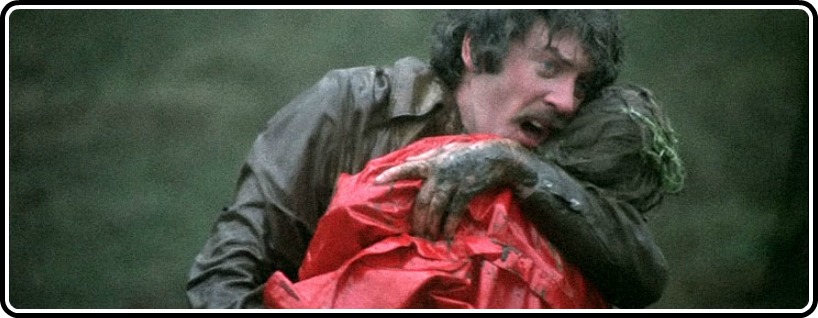When any cinephile thinks of the great horror maestros, the last name that one normally has pop up in his or her head is the great auteur named Nicolas Roeg. Best known for his erotically charged and fever dream-like filmmaking aesthetic, Roeg is best known for his sci-fi masterpiece The Man Who Fell To Earth, and his even more experimental work like Bad Timing or the underrated masterpiece Insignificance.
However, as the years have passed, Roeg has seen one of his most underrated works become one of his most beloved. Don’t Look Now, Roeg’s 1973 adaptation of a Daphne du Maurier short story entitled ‘Not After Midnight,’ has become known as not only one of Roeg’s greatest cinematic efforts, blending the auteur’s experimental aesthetic with a genuine thriller narrative, but also one of the greatest thriller/horror films ever put to screen. And it’s also the one thriller, above all that have been made, that is in the most dire need of a Criterion Collection release.
Don’t Look Now‘s narrative is as definitive a thriller as the genre gets. After the tragic death of their young daughter, a couple, played by Julie Christie and Donald Sutherland, head off to Venice to get away from things. With a mysterious figure snuffing out the lives of various people on the exterior of the story, just making brief mentions throughout the plot, the couple find their relationship tested by a medium, a mysterious raincoat-wearing figure, and everything in between, in what is both a brilliant thriller and also a beautifully crafted look into a relationship on the brink. Simply put, it’s one of the greatest thrillers ever made.
With any Roeg film, comes that director’s stylistic stamp. Narratively, the film is very much a brutally honest look at interpersonal relationships. There are moments of sheer joy ‘“ take for example a beautifully edited and filmed sex scene between our leads, that is both playful and erotic ‘“ while always carrying with it a great sense of existential melancholy, dashing out any hope that is seen in the film replacing it with a cloud of doom that is always hanging over the proceedings. Visually just as doom and gloomy, always tinged with a fog-like haze, the film features Roeg’s kinetic editing and jump cuts, adding a great deal of tension to a film that is for all intents and purposes a relationship drama. To Roeg, throughout his career, time becomes as fluid as the water that becomes so prevalent throughout this single film. Roeg’s work is inherently kinetic with regards to the time and space that they play with, that this is a prototypical Roeg film stylistically and structurally.
The performances here are also some of the best in the careers of two of cinema’s greatest giants. Both Sutherland and Christie are top notch here. Their relationship is real and palpable, and the loss that the two feel throughout the film really weighs not only on the overall mood of the film, but also the viewer. The pair are fully attempting to move forward together and with one another, but the melancholy that is leveled entirely on the shoulders of the lead duo adds such a level of emotional depth that is relatively rare within the world of thrillers.
Roeg’s filmography is full of iconic masterpieces. Walkabout and Man Who Fell To Earth are some of the truly greatest films ever made, with the aforementioned films like Insignificance being some of the most underrated gems ever to be held within the ranks of The Criterion Collection. The company obviously loves the man. Various home video releases have hit the market, but few to none are relatively available. Over the past handful of decades since its release, the film’s status within the film world and the horror world specifically has risen to heights never seen for the film, so there are obviously fans of the picture. Danny Boyle, a Criterion-approved auteur, has stated a myriad of times that Roeg is a huge influence, so Criterion could stand to have an interview or a commentary with him. The film is a critical darling, so a Brit-thriller commentator, someone like a Mark Kermode, could stand to toss a commentary on the disc. Toss in some retrospectives and a standard Criterion masterpiece of a transfer, and you could have a massively popular release for the boutique label.
Overall, while a Criterion Collection release of Don’t Look Now has been talked about and hoped for for years now, the film itself will stand as one of the greatest films from one of the greatest filmmakers of all time no matter who has their home video rights. The picture s a breathtaking look at a couple on the verge of seeing a past tragedy take its final victim. A meditation on death and grief, the film is a thriller by aesthetic but a relationship drama at its heart. With one of the most thrilling conclusions around and some of the most stunning visuals from a director who would make visuals his statement, Don’t Look Now is simply a masterpiece.




![Bergman Island (The Criterion Collection) [Blu-ray]](https://criterioncast.com/wp-content/uploads/2022/11/bergman-island-the-criterion-collection-blu-ray-400x496.jpg)
![This Is Not a Burial, It’s a Resurrection (The Criterion Collection) [Blu-ray]](https://criterioncast.com/wp-content/uploads/2022/11/this-is-not-a-burial-its-a-resurrection-the-criterion-collection-blu-ray-400x496.jpg)
![Lars von Trier's Europe Trilogy (The Criterion Collection) [The Element of Crime/Epidemic/Europa] [Blu-ray]](https://criterioncast.com/wp-content/uploads/2022/11/lars-von-triers-europe-trilogy-the-criterion-collection-the-element-of-400x496.jpg)
![Imitation of Life (The Criterion Collection) [Blu-ray]](https://criterioncast.com/wp-content/uploads/2022/11/imitation-of-life-the-criterion-collection-blu-ray-400x496.jpg)
![The Adventures of Baron Munchausen (The Criterion Collection) [4K UHD]](https://criterioncast.com/wp-content/uploads/2022/11/the-adventures-of-baron-munchausen-the-criterion-collection-4k-uhd-400x496.jpg)
![Cooley High [Criterion Collection] [Blu-ray] [1975]](https://criterioncast.com/wp-content/uploads/2022/11/cooley-high-criterion-collection-blu-ray-1975-400x496.jpg)